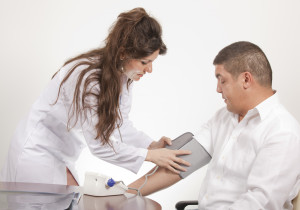 High blood pressure, also called hypertension, can be a lifelong disease. When left untreated, high blood pressure can cause other health problems such heart disease or stroke. For many individuals, it is necessary to take one or more medications every day for life in order to control blood pressure. However, with healthy lifestyle changes many can lower their blood pressure naturally and eliminate the need for medications.
High blood pressure, also called hypertension, can be a lifelong disease. When left untreated, high blood pressure can cause other health problems such heart disease or stroke. For many individuals, it is necessary to take one or more medications every day for life in order to control blood pressure. However, with healthy lifestyle changes many can lower their blood pressure naturally and eliminate the need for medications.
10 ways to reduce blood pressure
1. Eat a healthy diet – The DASH diet (Dietary Approaches to Stop Hypertension) can help lower blood pressure. The DASH diet limits foods that are high in sodium while emphasizing foods that are rich in nutrients like magnesium, calcium and potassium. Eating a diet with plenty of vegetables, fruits, whole grains, fish, poultry, low-fat dairy products and nuts can naturally lower blood pressure.
2. Lose weight – Extra weight can have a large impact on blood pressure. Weight loss is one of the most effective ways to treat hypertension. According to the Mayo Clinic losing just 10 pounds of extra weight can help normalize blood pressure.
3. Exercise – The Department of Health and Human Services recommends every adult gets 150 minutes of moderate aerobic exercise or 75 minutes of vigorous aerobic exercise each week. Walking, jogging, swimming, dancing and cycling are some of the best exercises to lower blood pressure. Always consult with a doctor before starting an exercise program.
4. Eat less sodium – Controlling sodium is more than just putting down the salt shaker. The FDA recommends a daily sodium limit of 2,300 milligrams, but restricting sodium to under 1,500 milligrams can go a long way in stabilizing blood pressure.
5. Limit caffeine – Caffeine can cause a dramatic increase in blood pressure for some people. Individuals with high blood pressure should consult with their healthcare provider about limiting caffeine in their diets.
6. Quit Smoking – Smoking makes individuals more likely to get both high blood pressure and heart disease. Nicotine found in cigarettes raises blood pressure and heart rate by narrowing the arteries and increasing the risk of blood clots. Smoking stresses the heart and raises the potential for heart attacks and stoke.
7. Drink less alcohol – Moderate drinking, 1 drink per day for women or 2 for men, can potentially lower blood pressure. However, heavy and/or binge drinking can substantially raise blood pressure as well as reduce the effectiveness of blood pressure medications.
8. Monitor Blood Pressure – Blood pressure can fluctuate so regularly monitoring it at home is important. Individuals with high blood pressure should always take readings at the same time each day and keep a diary so their healthcare provider can determine whether the treatment plan is working.
9. Reduce Stress – Stress is a known contributing factor for high blood pressure. When a person is stressed the body reacts by releasing stress hormones into the blood which cause the heart to beat faster and constrict the blood vessels. When this happens chronically it can lead to high blood pressure.
10. Get Enough Sleep – Over time the lack of sleep can hurt the body’s ability to regulate stress hormones which can cause high blood pressure. The National Sleep Foundation recommends that adults get 7 to 9 hours of sleep each night. Going to bed and waking up at the same time each day can help individuals to fall asleep sooner and sleep deeper throughout the night.
The cardiology and vascular departments at OakBend Medical Center are committed to pioneering the latest treatments and research. They dedicate themselves to remaining at the forefront of cardiovascular medicine and they continue to offer the next generation of research, technology and surgical techniques. If you have high blood pressure please contact call 281-341-3000 to make an appointment with a Houston cardiac specialist.
I Have High Blood Pressure, What Should I Do?
OakBend Medical Center © 2024 All rights reserved
